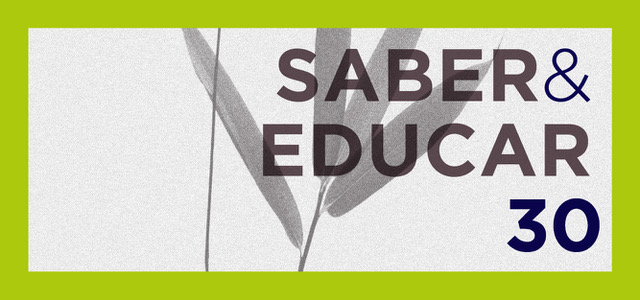Current Needs of Preschool Teachers for Professional Development in Greece
A Focus Group Study
DOI:
https://doi.org/10.25767/se.v30i.29478Palavras-chave:
Professional development, Quality of education, Preschool teachers’ needs, Early childhood education and careResumo
This paper presents a brief overview of the literature regarding preschool teachers’ careers and professional development. The main purpose of the part of the study presented here was to conduct a needs-assessment exercise to identify the specific needs for professional development of early childhood teachers’ in Greece. Data were collected through a focus group. Results highlighted the challenges of moving forward in a teaching career and the need for increasing professional development opportunities that match teachers’ needs and interests. Professionals indicated that the absence of teacher-parents’ collaboration and structured practices for dealing with children’s discipline issues are their basic concerns. Implications of the study’s results are also discussed
This project has been funded by the Erasmus+ Programme of the European Union. Project Number: 626146-EPP-1-2020-2-EL-EPPKA3-PI-POLICY
Referências
Alamos, P., and Williford, A. P. (2020). Exploring dyadic teacher–child interactions, emotional security, and task engagement in preschool children displaying externalizing behaviors. Social Dev. 29 (1), 339-355. doi:10.1111/sode.12403
Beltman, S., Mansfield, C. F., Wosnitza, M., Weatherby-Fell, N., & Broadley, T. (2018). Using online modules to build capacity for teacher resilience. In Resilience in Education (pp. 237-253). Springer, Cham.
Brock, L. L., & Curby, T. W. (2014). Emotional support consistency and teacher–child relationships forecast social competence and problem behaviors in prekindergarten and kindergarten. Early Education and Development 25 (5), 661-680. doi:10.1080/10409289.2014.866020
Cadima, J. Verschueren, K., Leal, T., & Guedes, C. (2016). Classroom interactions, dyadic teacher–child relationships, and self–regulation in socially disadvantaged young children. Journal of Abnormal Child Psychology, 44, 7–17. doi: 10.1007/s10802-015- 0060-5
Davis, A. E., Barrueco, S., & Perry, D. F. (2021). The role of consultative alliance in infant and early childhood mental health consultation: Child, teacher, and classroom outcomes. Infant Mental Health Journal, 42(2), 246-262.
Day, Christopher (2004). A passion for teaching. London: Routledge Falmer.
Early, D. M., Maxwell, K. L., Ponder, B. D., & Pan, Y. (2017). Improving teacher-child interactions: A randomized controlled trial of Making the Most of Classroom Interactions and My Teaching Partner professional development models. Early Childhood Research Quarterly, 38, 57-70. https://doi.org/10.1016/j.ecresq.2016.08.005
Egert, F., Fukkink, R. G., & Eckhardt, A. G. (2018). Impact of In-Service Professional Development Programs for Early Childhood Teachers on Quality Ratings and Child Outcomes: A Meta-Analysis. Review of Educational Research, 88(3), 401-433. https://doi.org/10.3102/0034654317751918
ET2020 Working group (2021). Early Childhood Education and Care: How to recruit, train and motivate well-qualified staff. Luxembourg: Publications Office of the European Union, European Commission. doi:10.2766/489043
European Commission (2014). Proposal for key principles of a quality framework for early childhood education and care. Brussels: Author.
European Commission/EACEA/Euridice (2019). Key Data on Early Childhood Education and Care in Europe - 2019 Edition. Eurydice Report. Luxembourg: Publications Office of the European Union.
European Commission/EACEA/Eurydice (2021). Teachers in Europe: Careers, Development and Well-being. Eurydice report. Luxembourg: Publications Office of the European Union.
Gore, J., Lloyd, A., Smith, M., Bowe, J., Ellis, H., & Lubans, D. (2017). Effects of professional development on the quality of teaching: Results from a randomised controlled trial of Quality Teaching Rounds. Teaching and Teacher Education, 68, 99-113.
Gregoriadis, A., Grammatikopoulos, V., & Zachopoulou, E. (Eds.) (2018a). Professional Development and Quality in Early Childhood Education: Comparative European Perspectives. UK: Palgrave Macmillan.
Gregoriadis, A., Papandreou, M., & Birbili, M. (2018b). Continuing professional development in the Greek early childhood education system. Early Years, 38(3), 271-285.
Gregoriadis, A., Zachopoulou, E., & Grammatikopoulos, V. (2018). Professional Development and Impact of the Early Change Project: Reflections from the Greek Example. In: A. Gregoriadis, V. Grammatikopoulos, E. Zachopoulou (Eds.), Professional Development and Quality in Early Childhood Education: Comparative European Perspectives (pp. 105-114). UK: Palgrave Macmillan.
Hamre, B. K., Partee, A., & Mulcahy, C. (2017). Enhancing the Impact of Professional Development in the Context of Preschool Expansion. AERA Open, 3(4). https://doi.org/10.1177/2332858417733686
Hamre, B. K., & Pianta, R. C. (2004). Self-reported depression in nonfamilial caregivers: Prevalence and associations with caregiver behavior in child-care settings. Early Childhood Research Quarterly, 19(2), 297-318.
Koivula, M., Gregoriadis, A., Rautamies, E., & Grammatikopoulos, V. (2019). Finnish and Greek early childhood teachers’ perspectives and practices in supporting children’s autonomy. Early Child Development and Care, 189(6), 990-1003.
Lang, S. N., Jeon, L., Schoppe-Sullivan, S. J., & Wells, M. B. (2020). Associations between parent–teacher cocaring relationships, parent–child relationships, and young children’s social emotional development. Child & Youth Care Forum, 623-646.
Malmberg, L. E., & Hagger, H. (2009). Changes in student teachers' agency beliefs during a teacher education year, and relationships with observed classroom quality, and day‐to‐day experiences. British Journal of Educational Psychology, 79(4), 677-694.
Mashburn, A. J., Pianta, R. C., Hamre, B. K., Downer, J. T., Barbarin, O. A., Bryant, D., ... Howes C. (2008). Measures of classroom quality in prekindergarten and children’s development of academic, language, and social skills. Child Development, 79, 732- 749. doi: 10.1111/j.1467-8624.2008.01154.x
O'Connor, E. (2010). Teacher–child relationships as dynamic systems. Journal of School Psychology, 48(3), 187-218.
OECD (2019). Providing Quality Early Childhood Education and Care: Results from the Starting Strong. Survey 2018, TALIS, OECD Publishing, Paris. https://doi.org/10.1787/23129638
OECD (2020). Building a High-Quality Early Childhood Education and Care Workforce: Further Results from the Starting Strong. Survey 2018, TALIS, OECD Publishing, Paris. https://doi.org/10.1787/b90bba3d-en.
OECD (2020). TALIS 2018 Results (Volume II): Teachers and School Leaders as Valued Professionals, TALIS. OECD Publishing, Paris. https://doi.org/10.1787/19cf08df-en
Perlman, M., Falenchuk, O., Fletcher, B., McMullen, E., Beyene, J., & Shah, P. S. (2016). A systematic review and meta-analysis of a measure of staff/child interaction quality (the classroom assessment scoring system) in early childhood education and care settings and child outcomes. PloS one, 11(12), e0167660.
Peixoto, F., Wosnitza, M., Pipa, J., Morgan, M., & Cefai, C. (2018). A multidimensional view on pre-service teacher resilience in Germany, Ireland, Malta and Portugal. In Resilience in education (pp. 73-89). Springer, Cham.
Prilleltensky, I., Neff, M., & Bessell, A. (2016). Teacher stress: What it is, why it's important, how it can be alleviated. Theory into Practice, 55(2), 104-111.
Sabol, T. J., Hong, S. S., Pianta, R. C., & Burchinal, M. R. (2013). Can rating pre-k programs predict children's learning?. Science, 341(6148), 845-846.
Sandilos, L. E., Goble, P., Rimm-Kaufman, S. E., & Pianta, R. C. (2018). Does professional development reduce the influence of teacher stress on teacher–child interactions in pre-kindergarten classrooms? Early Childhood Research Quarterly, 42, 280-290. https://doi.org/10.1016/j.ecresq.2017.10.009
Seligman, Martin. E. (2011). Flourish: a visionary new understanding of happiness and well-being. Policy, 27(3), 60-1.
Vandenbroeck, M., De Visscher, S., Van Nuffel, K., & Ferla, J. (2008). Mothers’ search for infant child care: The dynamic relationship between availability and desirability in a continental European welfare state. Early Childhood Research Quarterly, 23(2), 245-258.
Williford, A. P., Carter, L. M., Maier, M. F., Hamre, B. K., Cash, A., Pianta, R. C., & Downer, J. T. (2017). Teacher engagement in core components of an effective, early childhood professional development course: Links to changes in teacher–child interactions. Journal of Early Childhood Teacher Education, 38(1), 102-118. https://doi.org/10.1080/10901027.2016.1269028
Wolf, S., Aber, J. L., Behrman, J. R., & Tsinigo, E. (2018). Experimental Impacts of the “Quality Preschool for Ghana” Interventions on Teacher Professional Well-being, Classroom Quality, and Children’s School Readiness. Journal of Research on Educational Effectiveness, 12(1), 10-37. https://doi.org/10.1080/19345747.2018.1517199
Zachopoulou, E., Grammatikopoulos, V., & Gregoriadis, A. (2018). Early Change: Description of a Project for Continuing Professional Development. In Professional Development and Quality in Early Childhood Education (pp. 59-81). Palgrave Macmillan, Cham.
Downloads
Publicado
Como Citar
Edição
Secção
Licença

Este trabalho encontra-se publicado com a Licença Internacional Creative Commons Atribuição-NãoComercial-SemDerivações 4.0.
Os autores mantêm os direitos de autor e concedem à Saber & Educar o direito de primeira publicação, com o trabalho simultaneamente licenciado sob a Licença Creative Commons Attribution 4.0 International (CC BY 4.0) que permite que outros partilhem, adaptem e redistribuam o trabalhopara qualquer finalidade, inclusive comercial, desde que seja dado o devido crédito à autoria e à publicação inicial nesta revista.
A revista reserva o direito de efetuar, nos originais, alterações de ordem normativa, ortográfica e gramatical, com vista a manter o padrão culto da língua, respeitando, porém, o estilo dos autores.
As opiniões emitidas pelos autores dos artigos são da sua exclusiva responsabilidade.
A submissão de artigos a esta revista não contempla qualquer pagamento ou taxa.
Autores têm permissão e são estimulados a publicar e distribuir o seu trabalho online (por exemplo, em repositórios institucionais ou páginas pessoais),pois isso pode aumentar o impacto e a citação do trabalho publicado (Ver O Efeito do Acesso Livre).
Os nomes e endereços fornecidos nesta revista serão usados exclusivamente para os serviços prestados por esta publicação, não sendo divulgados para outras finalidades ou a terceiros.
Legislação aplicável: Política de Proteção de Dados






